Israel's outpost approvals boost settlers, deepen conflict
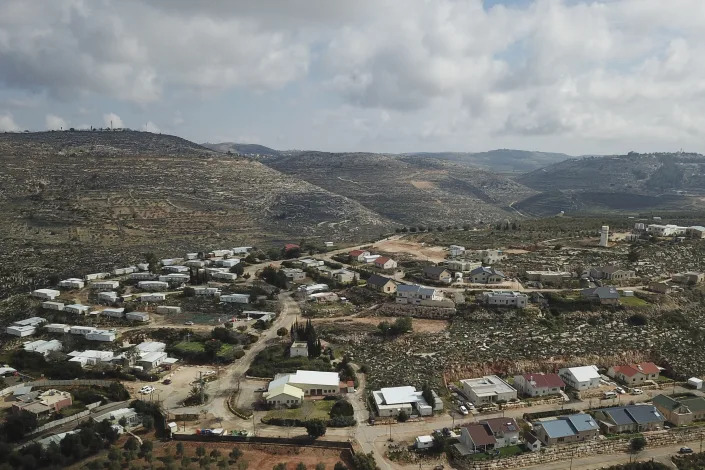
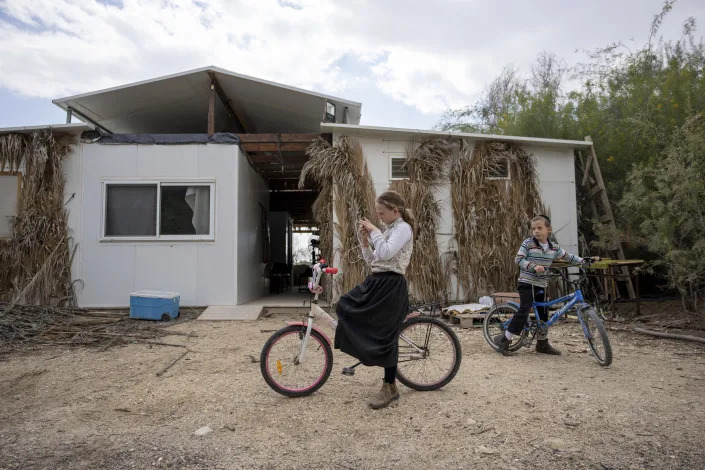
1 / 13
A view of the West Bank Jewish outpost of Givat Harel, Thursday, Feb. 16, 2023. Israel's new ultranationalist government declared last week that it would legalize 10 unauthorized outposts in the occupied West Bank. The rare move intensified the country's defiance of international pressure and opened an aggressive new front of Israeli expansion into the West Bank, which Israel captured in the 1967 Mideast war.
GIVAT HAREL, West Bank (AP) — One day in the fall of 1998, Shivi Drori, a young farmer fresh out of the Israeli army, brought three trailers to a rugged hilltop deep in the occupied West Bank and began to plant raspberries.
It was an unauthorized settlement in the heart of territory claimed by the Palestinians, but Drori, now 49, said he considered himself to be “in a way, working with the government.”
Today, more than 90 Jewish families live in what has become the thriving village of Givat Harel — full of concrete homes with breathtaking views, a crowded nursery and an award-winning vineyard.
Just down the road is Turmus Aya, a Palestinian village that lost part of its land to the nearby Shilo settlement two decades ago. One of the villagers, Amal Abu Awad, 58, has watched her world shrink since the settlers arrived.
She said settlers prevented her late husband from reaching his grazing land and periodically uprooted her olive trees. Last week, masked vandals attacked her house, armed with clubs and knives, shouting insults as they smashed windows and broke her solar panels.
Her seven sons now take turns perching on the roof overnight, watching out for vigilantes.
“This was our land long before they thought to claim it,” she said.
Prime Minister Benjamin Netanyahu’s new far-right government announced last week it would legalize Givat Harel, along with nine other unauthorized West Bank outposts, boosting settlers' morale and strengthening their hold on the land.
Drori’s village, on a ridge between the Palestinian cities of Ramallah and Nablus, is part of an extensive network of 150 outposts now home to some 20,000 settlers, according to anti-settlement watchdog Peace Now. The outposts appeared over the past three decades, many built at least partially on private Palestinian land, Peace Now says.
While the outposts were established without formal government authorization, they often received tacit government support or even public funding. Over 20% of the outposts, like Givat Harel, have been retroactively legalized, and more are in the pipeline.
Anti-settlement groups and experts describe a steady government effort to entrench Israeli rule over the West Bank and grab more occupied land that Palestinians seek for a future state. Strings of strategically located outposts have changed the landscape of the territory — threatening to make a future Palestinian state little more than a shriveled constellation of disconnected enclaves.
“We see this as a very big move toward annexation,” said Ziv Stahl, director of Israeli rights group Yesh Din. “Cementing the existence of these places blocks any hope for Palestinians to ever get their land back.”
On Monday, days after the government’s outpost approvals triggered widespread condemnation, Netanyahu declared a six-month freeze in recognizing new outposts — part of a U.S.-brokered agreement to avert a diplomatic crisis at the United Nations.
As a result, the U.N. Security Council approved a watered-down statement opposing Israel’s expansion of settlements, derailing a legally binding resolution that would have demanded a halt to Israeli settlement activity.
But Netanyahu made no public commitment to halt settlement construction. On Thursday, his government granted approval for over 7,000 new homes in Jewish settlements across the West Bank. Some of those homes, settlement opponents said, are located in four outposts that remain unauthorized.
Netanyahu's freeze “is meaningless,” said Lior Amihai from Peace Now.
Settlement critics describe a wink-and-nod policy toward outposts traced back to efforts by successive governments to deflect international pressure. Most of the world considers all Israeli settlements — home to some 700,000 people in the West Bank and annexed east Jerusalem — as a violation of international law.
In 1996, Israel pledged it would not establish new settlements as part of peace-making efforts with the Palestinians, but said it would need to keep building in existing ones to accommodate natural growth.
Since then, successive governments have made a distinction between authorized settlements and “illegal” outposts, such as Dori's Givat Harel.
Like many others, Givat Harel straddles both public and private land — including agricultural land belonging to the Palestinian villages of Sinjil and Qaryout, according to Dror Etkes, an anti-settlement activist who follows Israeli land policy in the West Bank.
From the outpost, both villages, along with other Palestinian towns, can be seen nestled in the undulating hills.
Drori dismissed claims of Palestinian ownership, saying the hilltop had long been vacant.
“We were fulfilling government desires, just in a weird way,” he said, speaking at the settlement’s vineyard, which exports some 100,000 bottles a year of locally produced Merlot, Cabernet Sauvignon and marquee blends named “Dancing Hills.”
"It’s always hush-hush," he said.
Givat Harel popped up during the first outpost building boom in the 1990s. Encouraged by Ariel Sharon, Israel's foreign minister in 1998 who famously exhorted settlers to “run and grab" Palestinian hilltops, Drori arrived at the scenic ridge.
Sharon even gifted Givat Harel its first water tankers, Drori said. The Ministry of Construction poured money into new houses. The local settler council installed electric towers, paved roads and piped water to the homes. In a sign of legitimacy, Israeli soldiers guarded the front gate.
Neighboring Palestinians, who could only obtain power from solar panels and routinely faced home demolitions because they lacked building permits in the Israeli-controlled part of the West Bank, warily eyed the outpost’s fresh paint and irrigated gardens.
Drori says he's a pioneer willing to live in a hostile land promised by God. As for the Palestinians, he said, “If you want to stay here, you have to get used to the Israeli government.”
A 2005 government report revealed widespread collusion among officials to illicitly divert state funds to unauthorized outposts. Its author, Talia Sasson, called for the immediate removal of outposts on private Palestinian land. Yet no action was taken against more than 100 outposts she identified.
Over the years, the United States and other Israeli allies decried settlements as an obstacle to peace. To avoid international censure, Israel repeatedly promised to dismantle the rogue outposts — but only two major ones were evacuated. Others were strategically registered as new neighborhoods of established settlements.
Now, settlers find their closest allies at the highest government levels. On Thursday, Netanyahu’s new coalition officially granted Finance Minister Bezalel Smotrich, a settler leader, authority over settlement construction.
Drori said Smotrich, a long-time friend, prayed and celebrated at Givat Harel the night of the recognition decision.
“Things will really change here for the good,” Drori said, describing his dreams to build an elementary school and expand the synagogue.
Smotrich and other far-right ministers plan to spend billions expanding and investing in settlements. Rights groups warn this will deepen the conflict with the Palestinians and lead to more bloodshed.
Down an unpaved dirt road in Turmus Aya, Abu Awad fixed her eyes on the hilltop overlooking her home. Last month settlers tried to set fire to a nearby house, burning the car in the driveway. Then last week came the attack on her home.
Police said they arrested two suspects over the arson attack. Palestinians, who are prosecuted in military courts with an extremely high conviction rate, have long complained about impunity enjoyed by settlers, who are charged, if at all, in civil ones.
“They cut the electricity so it was pitch black,” Abu Awad said. “In the dark, they could do whatever they wanted.”
___
Associated Press writers Tia Goldenberg in Tel Aviv, Israel, and Sam McNeil in Turmus Aya, West Bank, contributed to this report.
Israeli pro-settler minister formally gains West Bank powers

Israeli Finance Minister Bezalel Smotrich attends a cabinet meeting at the Prime Minister's office in Jerusalem
Thu, February 23, 2023
By Dan Williams
JERUSALEM (Reuters) -A far-right Israeli cabinet minister formally gained responsibilities over Jewish settlements in the occupied West Bank on Thursday that he said included bringing their legal status closer to that of communities within Israel.
Finance Minister Bezalel Smotrich wields a supervisory role for settlers in the Defence Ministry as part of his coalition deal with Prime Minister Benjamin Netanyahu, prompting increased U.S. focus on Israel's West Bank policies.
A 14-point statement issued by Smotrich after he agreed on a division of roles with Defence Minister Yoav Gallant included the assertion that "legislation on all (settlement) civilian matters will be brought into line with Israeli law".
Asked to elaborate, a Smotrich spokesperson said: "Equal application of relevant laws - on labour, the environment, et cetera - that are legislated in Lesser Israel."
"Lesser Israel" is a term used by ultranationalists like Smotrich - himself a settler - who seek annexation of the West Bank, a biblical and strategic area captured in a 1967 war.
"All settlement is illegal and any attempt by Israel to legalise or annex these settlements is rejected and is a violation of international resolutions," said Nabil Abu Rudeineh, spokesperson for Palestinian President Mahmoud Abbas.
The United States has reiterated its decades-old calls for a two-state solution between Israel and the Palestinians and called for restraint after a surge in violence in the West Bank, which the Palestinians want as the core of a future state.
Washington has also urged Israel not to expand settlements, which most world powers deem illegal.


1 / 13
A view of the West Bank Jewish outpost of Givat Harel, Thursday, Feb. 16, 2023. Israel's new ultranationalist government declared last week that it would legalize 10 unauthorized outposts in the occupied West Bank. The rare move intensified the country's defiance of international pressure and opened an aggressive new front of Israeli expansion into the West Bank, which Israel captured in the 1967 Mideast war.
(AP Photo/Sam McNeil)
ISABEL DEBRE
Fri, February 24, 2023
ISABEL DEBRE
Fri, February 24, 2023
GIVAT HAREL, West Bank (AP) — One day in the fall of 1998, Shivi Drori, a young farmer fresh out of the Israeli army, brought three trailers to a rugged hilltop deep in the occupied West Bank and began to plant raspberries.
It was an unauthorized settlement in the heart of territory claimed by the Palestinians, but Drori, now 49, said he considered himself to be “in a way, working with the government.”
Today, more than 90 Jewish families live in what has become the thriving village of Givat Harel — full of concrete homes with breathtaking views, a crowded nursery and an award-winning vineyard.
Just down the road is Turmus Aya, a Palestinian village that lost part of its land to the nearby Shilo settlement two decades ago. One of the villagers, Amal Abu Awad, 58, has watched her world shrink since the settlers arrived.
She said settlers prevented her late husband from reaching his grazing land and periodically uprooted her olive trees. Last week, masked vandals attacked her house, armed with clubs and knives, shouting insults as they smashed windows and broke her solar panels.
Her seven sons now take turns perching on the roof overnight, watching out for vigilantes.
“This was our land long before they thought to claim it,” she said.
Prime Minister Benjamin Netanyahu’s new far-right government announced last week it would legalize Givat Harel, along with nine other unauthorized West Bank outposts, boosting settlers' morale and strengthening their hold on the land.
Drori’s village, on a ridge between the Palestinian cities of Ramallah and Nablus, is part of an extensive network of 150 outposts now home to some 20,000 settlers, according to anti-settlement watchdog Peace Now. The outposts appeared over the past three decades, many built at least partially on private Palestinian land, Peace Now says.
While the outposts were established without formal government authorization, they often received tacit government support or even public funding. Over 20% of the outposts, like Givat Harel, have been retroactively legalized, and more are in the pipeline.
Anti-settlement groups and experts describe a steady government effort to entrench Israeli rule over the West Bank and grab more occupied land that Palestinians seek for a future state. Strings of strategically located outposts have changed the landscape of the territory — threatening to make a future Palestinian state little more than a shriveled constellation of disconnected enclaves.
“We see this as a very big move toward annexation,” said Ziv Stahl, director of Israeli rights group Yesh Din. “Cementing the existence of these places blocks any hope for Palestinians to ever get their land back.”
On Monday, days after the government’s outpost approvals triggered widespread condemnation, Netanyahu declared a six-month freeze in recognizing new outposts — part of a U.S.-brokered agreement to avert a diplomatic crisis at the United Nations.
As a result, the U.N. Security Council approved a watered-down statement opposing Israel’s expansion of settlements, derailing a legally binding resolution that would have demanded a halt to Israeli settlement activity.
But Netanyahu made no public commitment to halt settlement construction. On Thursday, his government granted approval for over 7,000 new homes in Jewish settlements across the West Bank. Some of those homes, settlement opponents said, are located in four outposts that remain unauthorized.
Netanyahu's freeze “is meaningless,” said Lior Amihai from Peace Now.
Settlement critics describe a wink-and-nod policy toward outposts traced back to efforts by successive governments to deflect international pressure. Most of the world considers all Israeli settlements — home to some 700,000 people in the West Bank and annexed east Jerusalem — as a violation of international law.
In 1996, Israel pledged it would not establish new settlements as part of peace-making efforts with the Palestinians, but said it would need to keep building in existing ones to accommodate natural growth.
Since then, successive governments have made a distinction between authorized settlements and “illegal” outposts, such as Dori's Givat Harel.
Like many others, Givat Harel straddles both public and private land — including agricultural land belonging to the Palestinian villages of Sinjil and Qaryout, according to Dror Etkes, an anti-settlement activist who follows Israeli land policy in the West Bank.
From the outpost, both villages, along with other Palestinian towns, can be seen nestled in the undulating hills.
Drori dismissed claims of Palestinian ownership, saying the hilltop had long been vacant.
“We were fulfilling government desires, just in a weird way,” he said, speaking at the settlement’s vineyard, which exports some 100,000 bottles a year of locally produced Merlot, Cabernet Sauvignon and marquee blends named “Dancing Hills.”
"It’s always hush-hush," he said.
Givat Harel popped up during the first outpost building boom in the 1990s. Encouraged by Ariel Sharon, Israel's foreign minister in 1998 who famously exhorted settlers to “run and grab" Palestinian hilltops, Drori arrived at the scenic ridge.
Sharon even gifted Givat Harel its first water tankers, Drori said. The Ministry of Construction poured money into new houses. The local settler council installed electric towers, paved roads and piped water to the homes. In a sign of legitimacy, Israeli soldiers guarded the front gate.
Neighboring Palestinians, who could only obtain power from solar panels and routinely faced home demolitions because they lacked building permits in the Israeli-controlled part of the West Bank, warily eyed the outpost’s fresh paint and irrigated gardens.
Drori says he's a pioneer willing to live in a hostile land promised by God. As for the Palestinians, he said, “If you want to stay here, you have to get used to the Israeli government.”
A 2005 government report revealed widespread collusion among officials to illicitly divert state funds to unauthorized outposts. Its author, Talia Sasson, called for the immediate removal of outposts on private Palestinian land. Yet no action was taken against more than 100 outposts she identified.
Over the years, the United States and other Israeli allies decried settlements as an obstacle to peace. To avoid international censure, Israel repeatedly promised to dismantle the rogue outposts — but only two major ones were evacuated. Others were strategically registered as new neighborhoods of established settlements.
Now, settlers find their closest allies at the highest government levels. On Thursday, Netanyahu’s new coalition officially granted Finance Minister Bezalel Smotrich, a settler leader, authority over settlement construction.
Drori said Smotrich, a long-time friend, prayed and celebrated at Givat Harel the night of the recognition decision.
“Things will really change here for the good,” Drori said, describing his dreams to build an elementary school and expand the synagogue.
Smotrich and other far-right ministers plan to spend billions expanding and investing in settlements. Rights groups warn this will deepen the conflict with the Palestinians and lead to more bloodshed.
Down an unpaved dirt road in Turmus Aya, Abu Awad fixed her eyes on the hilltop overlooking her home. Last month settlers tried to set fire to a nearby house, burning the car in the driveway. Then last week came the attack on her home.
Police said they arrested two suspects over the arson attack. Palestinians, who are prosecuted in military courts with an extremely high conviction rate, have long complained about impunity enjoyed by settlers, who are charged, if at all, in civil ones.
“They cut the electricity so it was pitch black,” Abu Awad said. “In the dark, they could do whatever they wanted.”
___
Associated Press writers Tia Goldenberg in Tel Aviv, Israel, and Sam McNeil in Turmus Aya, West Bank, contributed to this report.

Israeli Finance Minister Bezalel Smotrich attends a cabinet meeting at the Prime Minister's office in Jerusalem
Thu, February 23, 2023
By Dan Williams
JERUSALEM (Reuters) -A far-right Israeli cabinet minister formally gained responsibilities over Jewish settlements in the occupied West Bank on Thursday that he said included bringing their legal status closer to that of communities within Israel.
Finance Minister Bezalel Smotrich wields a supervisory role for settlers in the Defence Ministry as part of his coalition deal with Prime Minister Benjamin Netanyahu, prompting increased U.S. focus on Israel's West Bank policies.
A 14-point statement issued by Smotrich after he agreed on a division of roles with Defence Minister Yoav Gallant included the assertion that "legislation on all (settlement) civilian matters will be brought into line with Israeli law".
Asked to elaborate, a Smotrich spokesperson said: "Equal application of relevant laws - on labour, the environment, et cetera - that are legislated in Lesser Israel."
"Lesser Israel" is a term used by ultranationalists like Smotrich - himself a settler - who seek annexation of the West Bank, a biblical and strategic area captured in a 1967 war.
"All settlement is illegal and any attempt by Israel to legalise or annex these settlements is rejected and is a violation of international resolutions," said Nabil Abu Rudeineh, spokesperson for Palestinian President Mahmoud Abbas.
The United States has reiterated its decades-old calls for a two-state solution between Israel and the Palestinians and called for restraint after a surge in violence in the West Bank, which the Palestinians want as the core of a future state.
Washington has also urged Israel not to expand settlements, which most world powers deem illegal.
Smotrich said he would now also have "total responsibility" over zoning, surveys and sales of West Bank lands for settlers, who number around a half-million among 3.1 million Palestinians.
Confirming the Smotrich-Gallant agreement, Netanyahu said it was pursuant to the coalition deals.
Netanyahu said in 2019 that he would annex West Bank settlements - alarming the West and prompting the United Arab Emirates and Bahrain to forge ties with Israel a year later in exchange for the prime minister shelving the territorial plan.
The platform of Smotrich's Religious Zionism party calls for advancing West Bank settlement in the face of "a complex U.S. administration" by focusing dialogue on "the extent of sovereignty Israel will assert and the scale of construction and retroactive authorisation (of unsanctioned settler outposts)".
If formal annexation is not possible due to U.S. opposition, it adds, "de facto assertion of sovereignty should be pursued".
(Additional reporting by Ali Sawafta; Writing by Dan Williams; Editing by Nick Macfie and Mark Potter)
Confirming the Smotrich-Gallant agreement, Netanyahu said it was pursuant to the coalition deals.
Netanyahu said in 2019 that he would annex West Bank settlements - alarming the West and prompting the United Arab Emirates and Bahrain to forge ties with Israel a year later in exchange for the prime minister shelving the territorial plan.
The platform of Smotrich's Religious Zionism party calls for advancing West Bank settlement in the face of "a complex U.S. administration" by focusing dialogue on "the extent of sovereignty Israel will assert and the scale of construction and retroactive authorisation (of unsanctioned settler outposts)".
If formal annexation is not possible due to U.S. opposition, it adds, "de facto assertion of sovereignty should be pursued".
(Additional reporting by Ali Sawafta; Writing by Dan Williams; Editing by Nick Macfie and Mark Potter)
Israel approves over 7,000 settlement homes, groups say

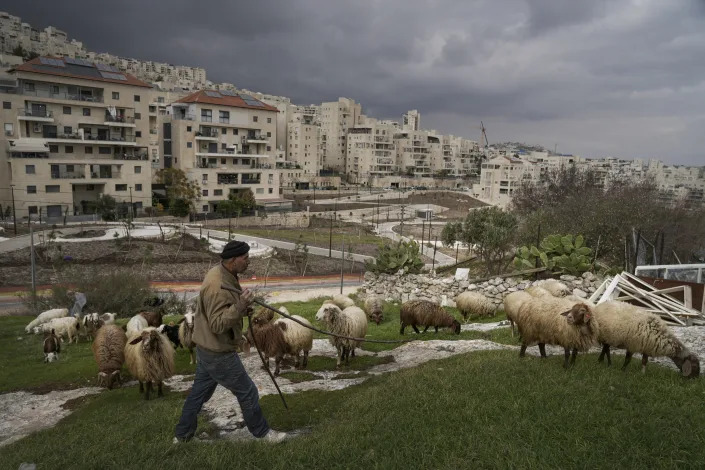
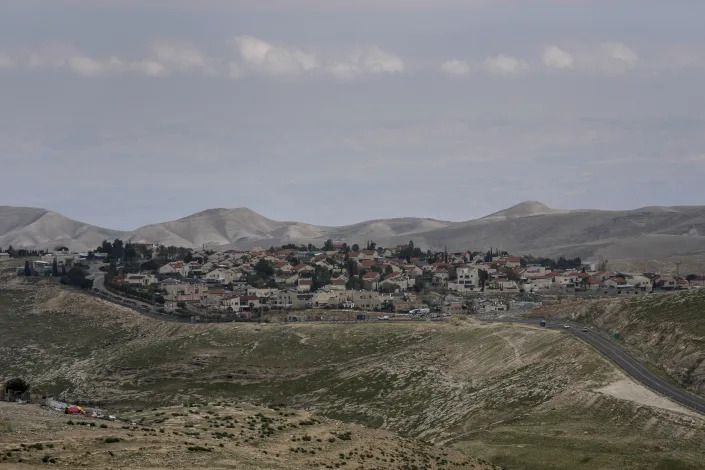
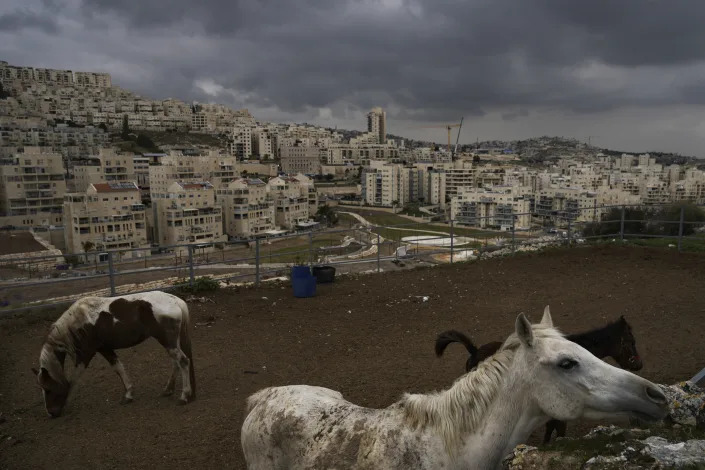
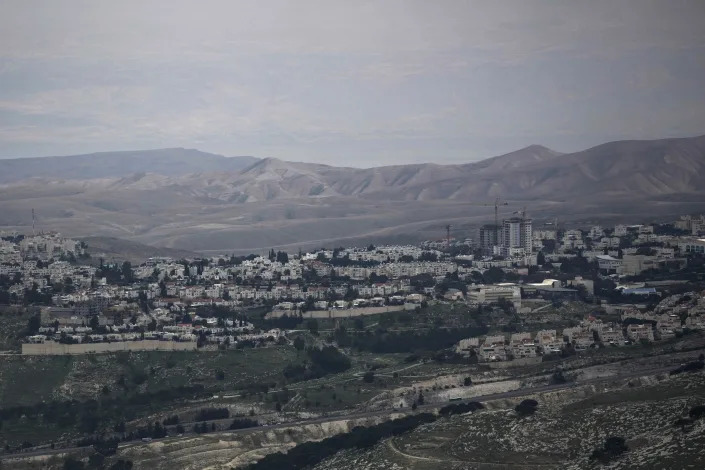
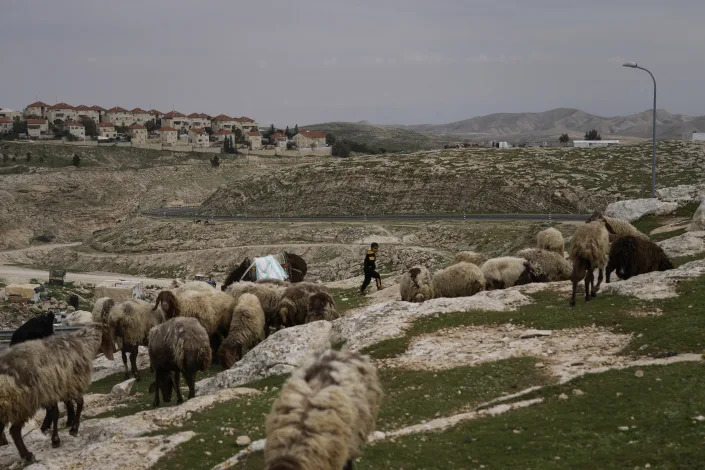

Horses walk in a farm belonging to a Palestinian family, in front of Har Homa, an Israeli settlement in east Jerusalem that Israel considers a neighborhood of its capital, Thursday, Feb. 23, 2023.
JERUSALEM (AP) — Israel’s far-right government has granted approval for over 7,000 new homes in Jewish settlements in the West Bank, settlement backers and opponents said Thursday. The move defies growing international opposition to construction in the occupied territory.
The announcement came just days after the U.N. Security Council passed a statement strongly criticizing Israeli settlement construction on occupied lands claimed by the Palestinians. The United States, Israel’s closest ally, blocked what would have been an even tougher legally binding resolution, with diplomats saying they had received Israeli assurances of refraining from unilateral acts for six months.
The new approvals took place during a two-day meeting that ended Thursday and appeared to contradict those claims. The U.S. has repeatedly criticized Israeli settlement construction, saying it undermines hopes for a two-state solution with the Palestinians, but taken no action to stop it.
Peace Now, an anti-settlement watchdog group that attended the meeting, said a planning committee granted approvals for some 7,100 new housing units across the West Bank.
The group said the committee scheduled a meeting next month to discuss plans to develop a strategic area east of Jerusalem known as E1. The U.S. in the past has blocked the project, which would largely bisect the West Bank and which critics say would make it impossible to establish a viable Palestinian state alongside Israel.







Horses walk in a farm belonging to a Palestinian family, in front of Har Homa, an Israeli settlement in east Jerusalem that Israel considers a neighborhood of its capital, Thursday, Feb. 23, 2023.
(AP Photo/Mahmoud Illean)
JOSEF FEDERMAN
Thu, February 23, 2023
JOSEF FEDERMAN
Thu, February 23, 2023
JERUSALEM (AP) — Israel’s far-right government has granted approval for over 7,000 new homes in Jewish settlements in the West Bank, settlement backers and opponents said Thursday. The move defies growing international opposition to construction in the occupied territory.
The announcement came just days after the U.N. Security Council passed a statement strongly criticizing Israeli settlement construction on occupied lands claimed by the Palestinians. The United States, Israel’s closest ally, blocked what would have been an even tougher legally binding resolution, with diplomats saying they had received Israeli assurances of refraining from unilateral acts for six months.
The new approvals took place during a two-day meeting that ended Thursday and appeared to contradict those claims. The U.S. has repeatedly criticized Israeli settlement construction, saying it undermines hopes for a two-state solution with the Palestinians, but taken no action to stop it.
Peace Now, an anti-settlement watchdog group that attended the meeting, said a planning committee granted approvals for some 7,100 new housing units across the West Bank.
The group said the committee scheduled a meeting next month to discuss plans to develop a strategic area east of Jerusalem known as E1. The U.S. in the past has blocked the project, which would largely bisect the West Bank and which critics say would make it impossible to establish a viable Palestinian state alongside Israel.
Lior Amihai, the group's incoming director, said some 5,200 housing units were in the early stages of planning, while the remainder were approved for near-term construction. He also said construction was approved in four unauthorized outposts.
Earlier this week, Prime Minister Benjamin Netanyahu’s office said he had pledged not to legalize any more wildcat outposts. He made the promise after retroactively legalizing 10 existing outposts earlier this month.
The Israeli government is “spitting on the face of the U.S., only a few days after announcing that they committed to them that there would be no advancement of settlements in the near future,” said Peace Now.

The United States criticized the decision. “We view the expansion of settlements as an obstacle to peace that undermines the geographic viability of a two-state solution,” said a National Security Council Statement. But it gave no indication that the U.S. was prepared to act.
Nabil Abu Rudeineh, spokesman for Palestinian President Mahmoud Abbas, appealed to the United States to intervene. “The American side is required to stop this violation, which will not lead to any peace or stability in the region,” he said.
The planned construction is likely to add to the already heightened tensions following an Israeli military raid that killed 10 Palestinians in the West Bank city of Nablus on Wednesday.
The international community, along with the Palestinians, considers settlement construction illegal or illegitimate. Over 700,000 Israelis now live in the occupied West Bank and east Jerusalem — territories captured by Israel in 1967 and sought by the Palestinians for a future independent state.
Netanyahu’s new coalition, which took office in late December, is dominated by religious and ultranationalist politicians with close ties to the settlement movement. Finance Minister Bezalel Smotrich, a firebrand settler leader, on Thursday was officially granted Cabinet-level authority over settlement policies.

Smotrich had promised earlier this month a major settlement push. His office declined to comment Thursday, but settler representatives, who also attended the planning meeting, celebrated what they said were new approvals.
Yossi Dagan, a settler leader in the northern West Bank, welcomed the retroactive approval of 118 homes in “Nofei Nehemia,” an outpost in the northern West Bank, after a 20-year struggle. “Great news for Samaria, for settlement and for the entire nation of Israel,” he said, using the biblical name for the region.
Shlomo Neeman, chairman of the Yesha settler’s council, declared the approvals “a tremendous boost.” Neeman is also mayor of the “Gush Etzion” settlement bloc near Jerusalem, where settlers said hundreds of new homes were approved.
The decision marks one of the largest approvals of settlement construction in years. In comparison, some 8,000 units were approved in the previous two years, according to Peace Now.
“It's very big,” said Amihai.
___
AP correspondent Zeke Miller contributed reporting from Washington.
Earlier this week, Prime Minister Benjamin Netanyahu’s office said he had pledged not to legalize any more wildcat outposts. He made the promise after retroactively legalizing 10 existing outposts earlier this month.
The Israeli government is “spitting on the face of the U.S., only a few days after announcing that they committed to them that there would be no advancement of settlements in the near future,” said Peace Now.

The United States criticized the decision. “We view the expansion of settlements as an obstacle to peace that undermines the geographic viability of a two-state solution,” said a National Security Council Statement. But it gave no indication that the U.S. was prepared to act.
Nabil Abu Rudeineh, spokesman for Palestinian President Mahmoud Abbas, appealed to the United States to intervene. “The American side is required to stop this violation, which will not lead to any peace or stability in the region,” he said.
The planned construction is likely to add to the already heightened tensions following an Israeli military raid that killed 10 Palestinians in the West Bank city of Nablus on Wednesday.
The international community, along with the Palestinians, considers settlement construction illegal or illegitimate. Over 700,000 Israelis now live in the occupied West Bank and east Jerusalem — territories captured by Israel in 1967 and sought by the Palestinians for a future independent state.
Netanyahu’s new coalition, which took office in late December, is dominated by religious and ultranationalist politicians with close ties to the settlement movement. Finance Minister Bezalel Smotrich, a firebrand settler leader, on Thursday was officially granted Cabinet-level authority over settlement policies.

Smotrich had promised earlier this month a major settlement push. His office declined to comment Thursday, but settler representatives, who also attended the planning meeting, celebrated what they said were new approvals.
Yossi Dagan, a settler leader in the northern West Bank, welcomed the retroactive approval of 118 homes in “Nofei Nehemia,” an outpost in the northern West Bank, after a 20-year struggle. “Great news for Samaria, for settlement and for the entire nation of Israel,” he said, using the biblical name for the region.
Shlomo Neeman, chairman of the Yesha settler’s council, declared the approvals “a tremendous boost.” Neeman is also mayor of the “Gush Etzion” settlement bloc near Jerusalem, where settlers said hundreds of new homes were approved.
The decision marks one of the largest approvals of settlement construction in years. In comparison, some 8,000 units were approved in the previous two years, according to Peace Now.
“It's very big,” said Amihai.
___
AP correspondent Zeke Miller contributed reporting from Washington.


No comments:
Post a Comment